QuestionQUESTION: I have a five year old lion head rabbit. He started loosing the fur on his back and I thought the doorway into his sleeping area was too small and he was rubbing it off. My husband made the door bigger and he has lost even more hair. He has a guinea pig companion whom he just loves but she is fine and hasn't lost any of her long hair. Could he be allergic to something like the straw in his bed or is it mites ?
ANSWER: Hi Annie
It could be mites or other parasites.
If the rabbit has an abscess or is uncomfortable she may be trying to bite down or locate the source. It is common when an animal is in pain for it to gnaw on the body part or to bite on it to release pressure. Ensure this isn't the case by checking her skin for any rashes or skin irritations or insect bites. Parasites are common, you are right and they can be deadly in rabbits. There are certain parasites that cause death in rabbits because it affects the central nervous system causing paralysis and eventually death. Parasites, particularly mites can cause fur loss. A severe flea infestation can cause fur loss as well by excessively scratching etc. Have you witnessed the animal pulling the fur, or could it have been scratched off? Revolution is highly recommended for rabbits, find a qualified rabbit vet and it will cost about 5.00 a month and it is sooo much safer. And as blow, they can also cause fur loss, so maybe the worms haven't yet been eradicated? Because worms rob the body of nutrients, I would highly suggest adding a vitamin supplement to the water for the next few months. It will assist your rabbits health to get back on track. They are 10.00 at the pet store.
One of my does who was about five months plucked her abdomen almost bald. But I do believe there is an underlying cause and it could be one of many when diagnosed online. It will give you a better idea. However, rabbit.org will also list qualified rabbit veterinarians in your area and it would be an office exam, perhaps a stool sample and treatment.
http://www.rabbit.org/health/index.html#parasite
Check out the above link. It has photos of mange mites and what it would look like in rabbits. Does any of this look like what's going on?
Lionheads are terribly prone to hair balls as well, especially when losing fur. do you feed Timothy hay? Feed him plenty of it because it helps pass any hair balls.
Strangely, I have had a lot of emails regarding parasites and fur pulling. It is very common because of the time of year and because of the type of summer we have had the bugs are thriving. I would think first about parasites and then there are also other reasons for fur loss listed on the website.
Hope this helps.
Below is just more info on parasites for your information.
Alice
Here is some more specific info on different parasites: FindBurrowing Mange Mite Also worthy of mention is a nasty, though fairly uncommon (in rabbits) mite, the Burrowing Mange Mite (Trixacarus caviae) that can cause extremely painful itching. These may be quite difficult to visualize, even with skin biopsy. Although they are more common in Guinea Pigs (in which they can cause fatal seizures) than rabbits, these mites have been rarely reported on rabbits. Rabbits affected with Trixacarus caviae may itch so badly that they become aggressive and sullen, while showing no apparent symptoms of illness other than scratching. Fortunately, treatment with selamectin will kill these nasty parasites, affording the rabbit relief within 24 hours of medication. We have heard of several cases in which a formerly sweet-natured rabbit (already neutered) became inexplicably vicious. Attending veterinarians could find nothing obviously wrong, but it was only treatment with selamectin that solved the problem and allowed the rabbit to become his old, sweet self again. A mite infestation was never confirmed, but the circumstantial evidence leads us to wonder. Ringworm fungus Fur loss due to this microorganism is usually patchy, characterized by relatively round bald patches with distinct edges. The skin may be only slightly irritated, sometimes with tiny, raised red spots. Ringworm can be treated with topical application of miconazole- or ketoconazole-containing creams from your veterinarian (Do not use over-the-counter preparations for humans! These have not been formulated for use on an animal that grooms itself.). Fungal infections also can be treated with Program (lufenuron), which inhibits the formation of chitin (an important structural component of the fungus' cell walls). Always consult your veterinarian for the most appropriate medication for your rabbit's condition. -------------------------------------------------------------------------------- Other Possible Causes of Fur Loss Parasites are not the only reason your rabbit may be losing fur. Here are some other possibilities. -------------------------------------------------------------------------------- Fur loss around the rear end and belly: Urine Burn In some rabbits, fur loss is restricted to the area between the hind legs, around the tail, and sometimes up the belly and onto the feet. If there is no fur loss anywhere else on the body, then the possibility that a urinary tract problem (e.g., urinary tract infection, bladder sludge, bladder stone) causing urine leakage should be considered. It is important to learn a little about specific urinary tract disorders in rabbits, so that you will know what questions to ask your veterinarian. Like saliva, urine is caustic. If it collects in the fur, it will burn the underlying skin, causing fur to fall out and the skin to become red and raw. While the veterinarian is sorting out the cause of the urine leakage, and while medications are starting to do their work, you can keep your bunny comfortable and start the skin healing and fur growing back with a safe way to administer a rinse and/or dry Bunny Butt Bath. A rabbit should never be bathed completely, as this can cause so much stress as to be life-threatening. But a badly urine-burned behind must be gently cleansed, dried and protected so that the pain doesn't elicit worse problems, such as GI slowdown, or ileus. -------------------------------------------------------------------------------- Bacterial Infection Rabbits living in warm, humid climates are particularly susceptible to bacterial skin infections, since they often cannot stay sufficiently dry. Moisture (from rain or just from atmospheric humidity) collects in the fur, especially around the hindquarters, just above the tail and the backs of the thighs where the rabbit cannot easily reach, and the skin becomes friable, stinky, and dangerously prone to deadlyi myasis (fly strike). The best way to prevent this is to keep your rabbit in a dry habitat, and if your bunny is outdoors, to constantly check for signs of skin irritation due to too much moisture. Fly strike can occur and develop so quickly that missing fly eggs laid on bacteria-laden skin and fur can become a life-threatening situation in as little as twelve hours. If your vet diagnoses bacterial skin infection, the bunny may need to be shaved down over the affected areas, and appropriate medications administered, preferably guided by the results of a culture and sensitivity test to see which rabbit-safe antibiotic will be most effective against the particular pathogen your bunny has. -------------------------------------------------------------------------------- Hormone imbalance This is not often seen in rabbits, but is one possible cause of fur loss in any mammal. If your vet suspects this is the cause of your rabbit's fur loss, s/he may wish to take a blood sample and send it to a laboratory for analysis of thyroid function, and other endocrine systems. http://www.bio.miami.edu/hare/furloss.html Does the rabbit live alone? Could it possibly be plucking because of boredom, or are two rabbits fighting?
---------- FOLLOW-UP ----------
QUESTION: Linus does have a long haired guinea pig companion . She seems to be in fine health and has no hair loss. I can find no fur in the pen so I don't think she is fighting with him or pulling his fur out. They are extremely affectionate towards each other. I wonder though too if since guinea pigs aren't as fastidious with their toilet habits as rabbits are if her feces everywhere in the pen could be a cause ?
AnswerIts possible. I would keep it as clean as possible.
Be aware that while some guinea pigs live with rabbits their whole lives peacefully, some will live peacefully for awhile and then problems can arise between them for any number of reasons. Just ensure that the guinea is able to eat with the rabbit and isn't made to wait until most the food is gone. Many times the rabbit will be stronger and as hormones change as he gets older, he may become less tolerant toward the guinea pig.
Sometimes mites can be well hidden. Keep checking and clean the whole pen with javex and then rinse well to rid the entire cage and bedding of the mites.
The rabbit may also be molting. Sometimes if there is a thin layer of hair growing back its amazing how much hair they can lose. I have received many questions about suspected animals fighting but it has turned out to be a heavy shed which seems to be going on this year because of the heat. They will sometimes have a stripe down their back of shorter hair while the longer hair is still intact everywhere else.
Once the animals are treated (treat both because the guinea pig might be affected even though showing no symptoms) and the hut is entirely cleaned, if he is still losing fur then other causes should be explored such as disease and hormonal imbalances.
Glad the info assisted.
Alice

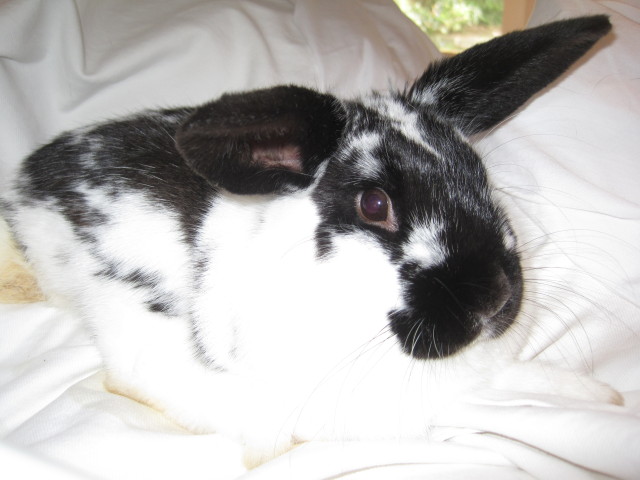 How do you know if a rabbit is ready to breed?
Question
my buck
Hi,
I have a black and white m
How do you know if a rabbit is ready to breed?
Question
my buck
Hi,
I have a black and white m
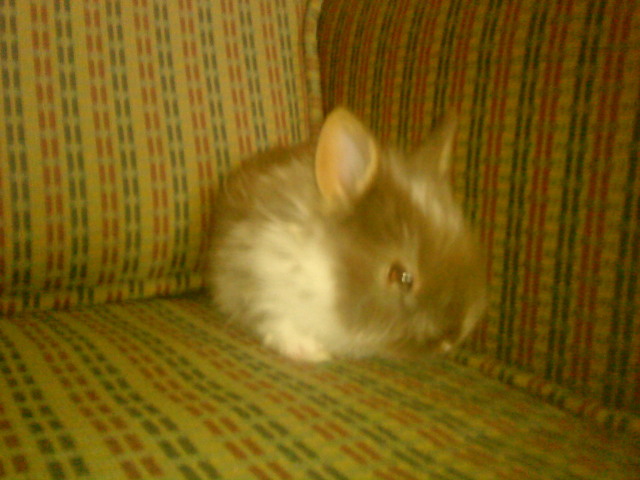 breed and age of my bunny
Question
thumper
Hi how are you sorry for the bother bu
breed and age of my bunny
Question
thumper
Hi how are you sorry for the bother bu
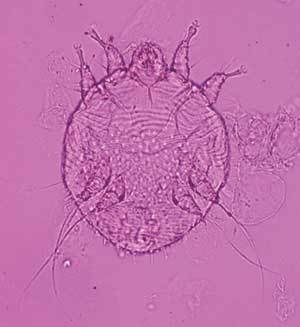 Help me please :(
Question
fur mite
Hello, I have a big problem an
Help me please :(
Question
fur mite
Hello, I have a big problem an
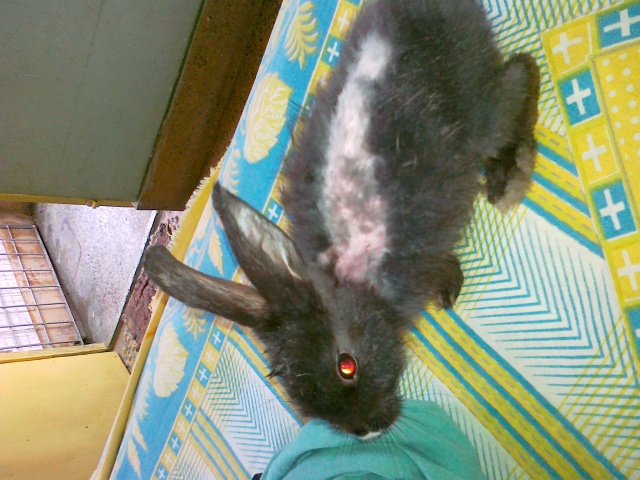 Is my rabbit sheding or has some other problem?
Questionbald rabbit
QUESTION: I am Indrani from
Is my rabbit sheding or has some other problem?
Questionbald rabbit
QUESTION: I am Indrani from
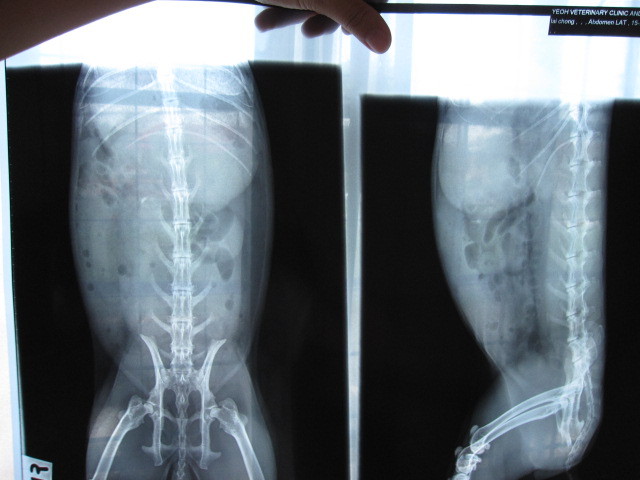 Thank you: my rabbit suspected of intestine rupture/blockage is fine
QuestionQUESTION: Hi,
my rabbit is currently hospitali
Thank you: my rabbit suspected of intestine rupture/blockage is fine
QuestionQUESTION: Hi,
my rabbit is currently hospitali